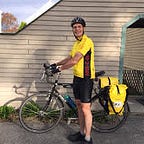This Earth Day: Do Something that Hurts…Until it Feels Good
Ask any person if they are sustainable and the answer is a resounding, “Yes.” After all, we’re all good people, and we want to save the earth, so we do our part. This one recycles beer cans. That one installs a set-back thermostat. The other guy rode the subway last week. Hooray! We’re all sustainable!
Of course, the accurate response to the question is, “No.” Since there is no agreed-upon definition of what constitutes “sustainable” we are all free to interpret it as we like. Yet by any meaningful measure, none of us live sustainable lives, giving more to our planet than we extract from it.
Almost a decade ago, in an after-midnight conversation more reminiscent of college than middle age, an inspiring Quaker said to me. “The only real measure of what we offer each other, and our planet, is how much sacrifice it entails. Giving up meat if you’re a vegetarian is meaningless. Taking your own bag to the grocery store is little more than a gesture. To do something meaningful demands that we make real change in how we live. The act of sacrifice heightens our consciousness, and acknowledges our appropriate place within the circle of life.”
Allen, a transportation consultant who lives in Portland, Maine, decided to give up flying; no easy feat in a society where people are accustomed to traveling great distances quickly. Some of Allen’s clients were wary of his ‘no-fly’ decision. He became an early adopter of virtual presentations, years before the pandemic and zoom. And if he decided to go to a meeting or conference beyond the Northeast in person, he adapted to accommodate days of travel.
Allen knew the environmental benefits of his commitment wouldn’t be noticeable until the number of non-flyers scaled up. But he found immediate, personal upsides. He learned to schedule his time more generously. He became all-around less hurried. Allen’s life got simpler.
I met Allen in May 2015, on the second day of what eventually spun into a fourteen-month, 20,000+-mile bicycle ride to every state in the continental US. He was my first warmshowers host, the first of many folks who challenged me about how I lived, even as I was living a life very different from most Americans.
Along the journey, in Nebraska, I gave up my two-coke-a-day habit. In California I decided to longer purchase or cook meat. When I got home I decided to see how long I could last without a car; still haven’t bought one. I turned off the heat in my bedroom on winter nights and added a comforter. I stopped using the gas dryer; I hang my laundry out to dry.
Each time I tweaked my life to accord with an environmental objective, my mind sizzled with objections. That I needed the bubbles and the caffeine; that I would crave hamburgers; that I was too busy to take the bus; that I’d catch a winter cold; that New England doesn’t offer enough sunny days to dry clothes.
But every time, over time, my objections withered and I came to appreciate — make that enjoy — a new pattern of my life. These days, I reserve cokes for marathon cycling trips, and they taste so much sweeter than when I downed them every day. I don’t miss hamburgers or steak at all, though sometimes, in a heavy-meat-on-the menu restaurant, I’ll order chicken and savor every bite. I get a lot of reading done waiting for the bus, and have become completely enamored with our commuter trains. I hate sleeping in a room that’s hot, and love the fresh scent of my clothes.
Nevertheless, when I tote the bins of trash and recycle and compost and garden trimmings to the curb each week, I display to all the world the evidence of my still-unsustainable life.
And so I keep looking for ways to tread more lightly on this earth. I haven’t made Allen’s sacrifice to forego flying completely, but I don’t fly distances under 1000 miles. Which means that New York, DC, even Chicago, now lie a bus or train-ride away in my mind. Last year I started a new, somewhat unsavory, environmental endeavor. I use my urine as fertilizer. It takes time to collect, ferment, and distribute. It was a hassle when I started. Now it’s just part of my routine. Meanwhile, our water bills have gone down, and my gardens are flourishing.
I don’t know what cockamamie sustainability practice I’ll normalize in my future, but I’m no longer put off by the prospect of, “that will be too hard,” or “that won’t make any difference.” As one in eight billion, I now my statistical contribution to extending our life on this planet is seconds, at best. But each individual’s seconds saved from extinction can multiply to minutes, hours, even years.
Meanwhile, every time I do something that hurts in service to the planet, I find that the hurt dissolves pretty quick, and is replaced by the satisfaction that maybe I’m doing something useful. And that something feels fine.
